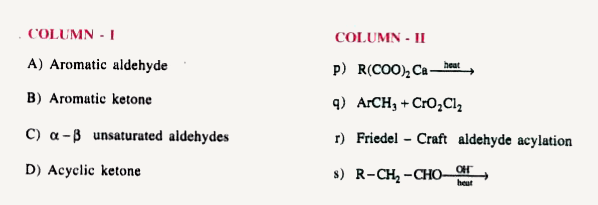Carbonyl compounds give different oxidation products with different reagents .Several oxidising agents can be used to oxidise carbonyy compounds .Ammonical silver nitate (tollens reagent ) oxidises aliphatic as well as aromatic aldehydes .
R−CHOTollens reagents −−−−−−−−−→R−COOh+Ag (silver mirror )
strong oxidatising agents like
KMnO4/H+,HNO3,K2Cr2O7/H+ oxidise
Aldehydes as well as ketons . open chain ketons in oxidation give mixture of two carbonylic acids . oxidation as well as ketons of unsymmetrical ketons takes place according to popoff's rule .According to this rule α- carbon whose bond breaks in oxidation always belongs to the alkyl group which has more number of carbons
which of the following is most reactive towards oxidation ? Solution in Telugu
HCHO
CH3CHO
CH3COCH3
CH3CH2CHO
The correct Answer is:A
HCHO is most reactive due to less steric heinderence and more polarity
Topper's Solved these Questions
- BOOK - AAKASH SERIESCHAPTER - ALDEHYDES AND KETONESEXERCISE - LEVEL-II LECTURE SHEET (EXERCISE-IV)8videos
ALDEHYDES AND KETONES
- BOOK - AAKASH SERIESCHAPTER - ALDEHYDES AND KETONESEXERCISE - LEVEL-II LECTURE SHEET (EXERCISE-V)16videos
ALDEHYDES AND KETONES
- BOOK - AAKASH SERIESCHAPTER - ALDEHYDES AND KETONESEXERCISE - LEVEL-II LECTURE SHEET (EXERCISE-II)28videos
ALDEHYDES AND KETONES
- BOOK - AAKASH SERIESCHAPTER - ALCOHOLS, PHENOLS AND ETHERSEXERCISE - ETHERS (OBJECTIVE EXERCISE-4)50videos
ALCOHOLS, PHENOLS AND ETHERS
- BOOK - AAKASH SERIESCHAPTER - ALKYL AND ARYL HALIDESEXERCISE - OBJECTIVE EXERCISE - 4 (ASSERTION (A) & REASON (R) TYPE QUESTIONS)19videos
ALKYL AND ARYL HALIDES
Similar Questions
Complete the following reaction
 04:15View Solution
04:15View SolutionHow many functional isomers are possible for the formula C4H8O?
01:54View SolutionWhich of the following give N- subtituted amide from ketoxime ?
View Solution(A): Alcoholic fermentation involves conversion of sugar into ethanol by the action of yeast.
(R): Fermentation involves the liberation of CO2 gas.04:43View Solution(A) Towards SN2 reaction, order of reactivity is CH3Br>CH3CH2Br>(CH3)2CHBr>(CH3)3CBr.
(R) Greater the stability of carbocation, greater will be its ease of formation from alkyl halide and faster will be the rate of SN1 reaction.View SolutionStatement 1: Formic acid reduces 'Tollens reagent'.
Statement 2: Compounds containing (−CHO) group reduce 'Tollens reagent'.03:52View SolutionAssertion: Formic acid reduces Tollens reagent. Reason : Compounds containing CHO group reduce Tollens reagent.
View SolutionAssertion : Fehling reagent is a test for all aliphatic aldehydes. Reason : Aliphatic aldehydes can be easily oxidised even with mild oxidising agents.
View SolutionStatement -I: Fehling ' s reagent is a test for all aliphatic aldehydes. Statement-II : Aliphatic aldehydes can be easily oxidised even with mild oxidising agents.
View Solution(A) Fehiling's reagent is a test for all aliphatic aldehydes. (R) Aliphatic aldehydes can be easily oxidesed even with mild oxidising agents.
View SolutionCarbonyl compounds give different oxidation products with different reagents. Several oxidising agents can be used to oxides carbonyl compound. Ammonical silver nitrate (Tollens' reagent) oxidises aliphitic as well as aromatic aldehydes. R-CHOoverset("Tollenes reagent ")rarrR-COOH+Ag("Silver mirror") Strong oxidising agents like KMnO_(4)//H^(+),HNO_(3) K_(2)Cr_(2)O_(7)//H^(+) oxidise aldehydes as well as ketones. Open chain ketnoes on oxidation give mixture of two carboxylic acids. Oxidation of unsymmetrical ketones takes place acording to Popoff's rule. According to this rule, alpha whose bond breks in oxidation always belongs to the alkyl group which has more number of carbons. Tollens' reagent gives positive test with :
01:54View SolutionCarbonyl compounds give different oxidation products with different reagents. Several oxidising agents can be used to oxides carbonyl compound. Ammonical silver nitrate (Tollens' reagent) oxidises aliphitic as well as aromatic aldehydes.
R−CHOTollenes reagent −−−−−−−−−−→R−COOH+Ag(Silver mirror)
Strong oxidising agents like KMnO4/H+,HNO3K2Cr2O7/H+ oxidise aldehydes as well as ketones. Open chain ketnoes on oxidation give mixture of two carboxylic acids. Oxidation of unsymmetrical ketones takes place acording to Popoff's rule. According to this rule, α whose bond breks in oxidation always belongs to the alkyl group which has more number of carbons.
The reagent which oxidises only aliphatic ketones is :03:18View SolutionCarbonyl compounds give different oxidation products with different reagents. Several oxidising agents can be used to oxides carbonyl compound. Ammonical silver nitrate (Tollens' reagent) oxidises aliphitic as well as aromatic aldehydes. R-CHOoverset("Tollenes reagent ")rarrR-COOH+Ag("Silver mirror") Strong oxidising agents like KMnO_(4)//H^(+),HNO_(3) K_(2)Cr_(2)O_(7)//H^(+) oxidise aldehydes as well as ketones. Open chain ketnoes on oxidation give mixture of two carboxylic acids. Oxidation of unsymmetrical ketones takes place acording to Popoff's rule. According to this rule, alpha whose bond breks in oxidation always belongs to the alkyl group which has more number of carbons. The prduct of given reaction is
01:30View SolutionCarbonyl compounds give different oxidation products with different reagents. Several oxidising agents can be used to oxides carbonyl compound. Ammonical silver nitrate (Tollens' reagent) oxidises aliphitic as well as aromatic aldehydes.
R−CHOTollenes reagent −−−−−−−−−−→R−COOH+Ag(Silver mirror)
Strong oxidising agents like KMnO4/H+,HNO3K2Cr2O7/H+ oxidise aldehydes as well as ketones. Open chain ketnoes on oxidation give mixture of two carboxylic acids. Oxidation of unsymmetrical ketones takes place acording to Popoff's rule. According to this rule, α whose bond breks in oxidation always belongs to the alkyl group which has more number of carbons.
2-Methylcycolhexanone on oxidation will give :01:23View SolutionCarbonyl compounds give different oxidation products with different reagents. Several oxidising agents can be used to oxides carbonyl compound. Ammonical silver nitrate (Tollens' reagent) oxidises aliphitic as well as aromatic aldehydes. R-CHOoverset("Tollenes reagent ")rarrR-COOH+Ag("Silver mirror") Strong oxidising agents like KMnO_(4)//H^(+),HNO_(3) K_(2)Cr_(2)O_(7)//H^(+) oxidise aldehydes as well as ketones. Open chain ketnoes on oxidation give mixture of two carboxylic acids. Oxidation of unsymmetrical ketones takes place acording to Popoff's rule. According to this rule, alpha whose bond breks in oxidation always belongs to the alkyl group which has more number of carbons. Which of the following ismost reactive towards oxidation ?
02:42View Solution

